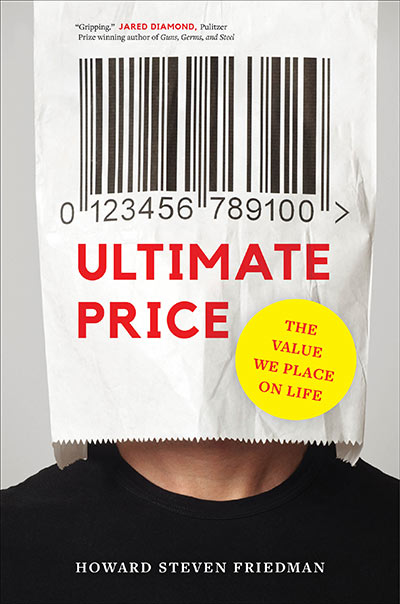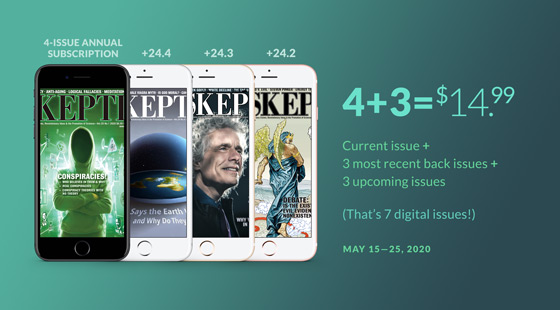SCIENCE SALON # 116
Michael Shermer with Howard Steven Friedman — Ultimate Price: The Value We Place on Life
How much is a human life worth? Individuals, families, companies, and governments routinely place a price on human life. The calculations that underlie these price tags are often buried in technical language, yet they influence our economy, laws, behaviors, policies, health, and safety. These price tags are often unfair, infused as they are with gender, racial, national, and cultural biases that often result in valuing the lives of the young more than the old, the rich more than the poor, whites more than blacks, Americans more than foreigners, and relatives more than strangers. This is critical since undervalued lives are left less-protected and more exposed to risk.
Howard Steven Friedman explains in simple terms how economists and data scientists at corporations, regulatory agencies, and insurance companies develop and use these price tags and points a spotlight at their logical flaws and limitations. He then forcefully argues against the rampant unfairness in the system. Readers will be enlightened, shocked, and, ultimately, empowered to confront the price tags we assign to human lives and understand why such calculations matter. Friedman and Shermer also discuss:
- the COVID-19 pandemic and the economic tradeoffs in the context of putting a price on human life
- how long should the economy be kept shut down in social isolation
- private vs. public calculations of the value of a human life
- the tradeoffs between conflicting moral values related to the value of human life (abortion, capital punishment, etc.)
- 9/11 and the calculations used to determine the value of each life lost
- calculating the devil we know (coal-related deaths) vs. the devil we don’t know (possible future nuclear-power related deaths)
- how the price of $10 million was determined for the current value of a human life
- organ sales as a form of human life valuation
- Should you have life insurance?
- When should you start collecting social security?
- why all lives should be treated equally in terms of statistical valuation, but why they are not.
Howard Steven Friedman, a leading statistician and health economist, is an expert in data science and applications of cost-benefit analysis. He teaches at Columbia University.
Listen to the podcast via Apple Podcasts, Spotify, Google Podcasts, Stitcher, iHeartRadio, and TuneIn.
Check Us Out On YouTube.
Science Salon • Skeptic Presents • All Videos
You play a vital part in our commitment to promoting science and reason. If you enjoy the Science Salon Podcast, please show your support.
THE GREAT COURSES PLUS
Get your free trial today
The Great Courses Plus makes lifelong learning and personal enrichment available to anyone, anywhere. Content-rich, unique courses provide you with a world of knowledge designed to expand your horizons, and deepen your understanding of hundreds of subjects. The Great Courses Plus has helped millions of lifelong learners take their learning to the next level.
Every course is thoroughly researched, extensively examined, and beautifully produced. The Great Courses specializes in crafting customized and entertaining learning journeys that are comprehensive, factual, and fascinating.
Sign up now using my special URL: thegreatcoursesplus.com/salon.
Get unlimited access to engaging and immersive learning experiences when you start a free trial today. Listen or watch on your TV, laptop, tablet, and smartphone. Pause, rewind, fast forward, or re-watch as often as you, and never listen to commercials.
DIGITAL SUBSCRIPTION SUPER SALE
Download our last 4 issues today, and
get the next 3 issues as they are released!
Our super sale on new Skeptic digital subscriptions via PocketMags.com continues through May 25, 2020. Get seven digital issues for only $14.99! New digital subscribers will receive:
- the current issue (25.1), plus
- the three most recent back issues (24.4, 24.3, and 24.2), plus
- the three upcoming issues (25.2, 25.3, and 25.4)
You will have instant access to issues 25.1, 24.4, 24.3, and 24.2 this Friday. You will have access to the upcoming issues (25.2, 25.3, and 25.4) as they are released in June 2020, September 2020, and December 2020.
To get this deal, your digital subscription must be made at PocketMags.com. You can then synchronize to your favourite Apple or Android device(s), or read on your PC or Mac.
Sale runs through May 25, 2020 Pacific Time. For more information about Skeptic digital subscriptions, please visit skeptic.com/magazine/app. If you have any questions, please email the Skeptic webmaster or PocketMags Support.












